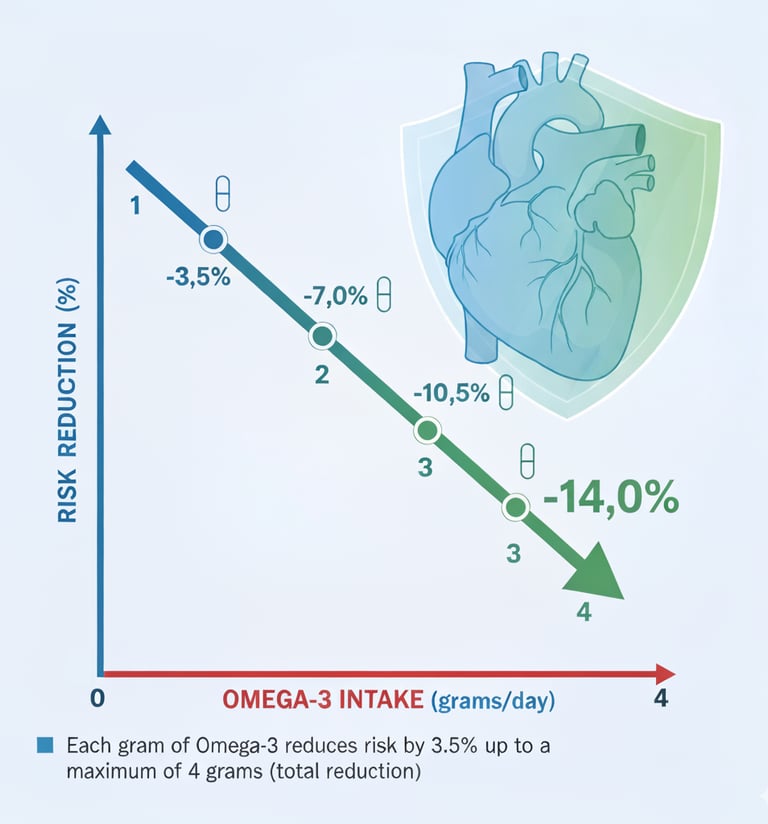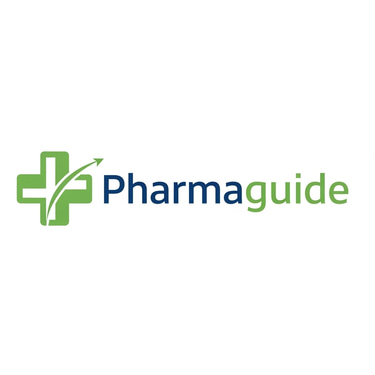Omega-3: How Just 1 Gram a Day Reduces Your Heart Disease Risk by 3.5%
Discover the real benefits of omega-3 fatty acids for your heart. We analyze two key scientific studies on EPA, DHA, and the prevention of cardiovascular diseases.
Nuri El azem De haro
9/21/20254 min read


What Are PUFA Fatty Acids and Why Should You Care?
You've probably heard of "good fats," but do you really know what they are and what they do for you? This group includes polyunsaturated fatty acids (PUFAs), a type of essential fat that our body cannot produce on its own and that we must obtain through our diet. The two most famous types are omega-3s and omega-6s.
While omega-6s are commonly found in vegetable oils like sunflower or corn, omega-3s—especially eicosapentaenoic acid (EPA) and docosahexaenoic acid (DHA)—are primarily associated with fatty fish (salmon, sardines, mackerel).
These compounds are crucial because they play a fundamental role in the fight against atherosclerotic cardiovascular disease (ASCVD). A complicated term? Think of it this way: ASCVD is the process by which arteries become "clogged" due to the accumulation of cholesterol and other substances, forming a plaque. This process, known as atherosclerosis, can lead to serious events like a myocardial infarction (heart attack) or a stroke. That's why understanding how PUFAs influence this process is vital for our health.
The Evidence in Depth: What Do Studies on Omega-3s Reveal?
By analyzing two recent meta-analyses—that is, studies that group and analyze the results of multiple high-quality research papers—the verdict is clear and powerful: supplementing with omega-3 fatty acids is associated with a lower risk of cardiovascular problems.
Both studies, which together review data from over 140,000 participants, came to similar conclusions. Omega-3 consumption was associated with a significant reduction in:
Total cardiovascular events.
Cardiovascular-related mortality.
Myocardial infarction (heart attack).
The need for revascularization (procedures to restore blood flow, such as a bypass or a stent).
The Unexpected Hero: The Key Role of EPA
This is where the story gets interesting. Not all omega-3s seem to act in the same way. Both analyses highlight that supplements containing only EPA (eicosapentaenoic acid) show a more pronounced and consistent benefit than mixtures of EPA and DHA.
One of the studies was blunt: while supplementation with EPA alone significantly reduced cardiovascular events, the mixture of EPA and DHA did not have a statistically significant impact on this specific outcome. The second study reinforces this idea, showing that EPA alone reduced the risk of heart attack by 28% and major adverse cardiovascular events (MACEs) by 24%.
This suggests that EPA could be the main active component responsible for the cardiovascular protection that omega-3s offer.
Quality Over Quantity: Health Food Store Supplement or Medical Prescription?
Not all omega-3 products are created equal, and this is a crucial point. One of the analyses focused exclusively on pharmaceutical-grade omega-3s (PUFA Rx), which are sold by prescription and regulated by agencies like the FDA in the U.S.
The difference is huge. While a common dietary supplement may contain low amounts of EPA and DHA (for example, 180 mg of EPA and 120 mg of DHA per capsule), prescription products guarantee high purity and concentration (generally more than 800 mg/g). This difference in quality and dosage could be the reason why some previous studies, which mixed both types of products, yielded contradictory results. The conclusion is that high-purity and high-concentration products consistently demonstrated their effectiveness.
What About Omega-6s?
While omega-3s grab headlines for their benefits, the evidence on omega-6s is much murkier. The meta-analysis that included them found no significant effect of omega-6 consumption on mortality or cardiovascular events. In fact, the authors classify the quality of the evidence as low and point to the need for more research to clarify their role. For now, the focus of cardiovascular protection remains firmly on omega-3s.
Practical Guide for the Consumer: Dose, Timing, and Results
Beyond the science, what does all this mean for you? Here's a summary of the most practical data from the studies:
Effective Dose: You don't need megadoses to see results. Benefits were observed even with doses of 1 gram per day of EPA+DHA. Furthermore, one of the studies found a linear relationship: for every additional gram per day of omega-3s (in a range of 1 to 4 g/day), the risk of mortality in patients with cardiovascular disease decreased by 3.5%.
Patience is Key: The most significant benefits were observed with long-term use. Analyses that separated results by treatment duration found that taking supplements for more than 3 years offered a more marked risk reduction than short-term use.
Positive Results to Highlight: Supplementation was associated with a 16% reduction in the risk of myocardial infarction, a 9% reduction in cardiac death, and a 12% reduction in total cardiovascular events.
Possible Adverse Effects: It's important to note that these two meta-analyses focused on efficacy and did not delve into adverse effects. Omega-3 supplements are generally safe, but in high doses, they can have anticoagulant effects or cause gastrointestinal discomfort.
A Critical Look: Strengths and Weaknesses of the Evidence
To get an objective view, it's fair to acknowledge both the strengths and limitations of these studies.
Strengths: The main strength is that both are meta-analyses of randomized controlled trials (RCTs), which is considered the highest level of scientific evidence. They also include a massive number of participants, which gives their conclusions a lot of weight.
Weaknesses: The main weakness pointed out in both articles is the heterogeneity among the included studies. This means there were differences in the type of patients, the exact doses used, and the duration of the treatments, which can complicate reaching a single, definitive conclusion. Additionally, the possibility of publication bias is mentioned for some results, meaning that studies with positive results are more likely to be published.
Conclusion: Should You Take Omega-3 Supplements?
The accumulated evidence is convincing. Supplementing with omega-3 fatty acids, especially those rich in EPA and of pharmaceutical grade, demonstrates a clear and significant benefit in preventing cardiovascular events, both for people who have already had an event (secondary prevention) and, in some cases, for those at high risk (primary prevention).
If you are considering taking supplements, the evidence suggests you should look for high-quality and high-purity products and be consistent with their long-term use. However, this article is for informational purposes and does not replace medical advice. The final recommendation is always the same: consult with your doctor or a healthcare professional like us to determine if omega-3 supplementation is right for you, what dose to take, and what type. Here is a link in case you are interested in supplementing with omega 3!


